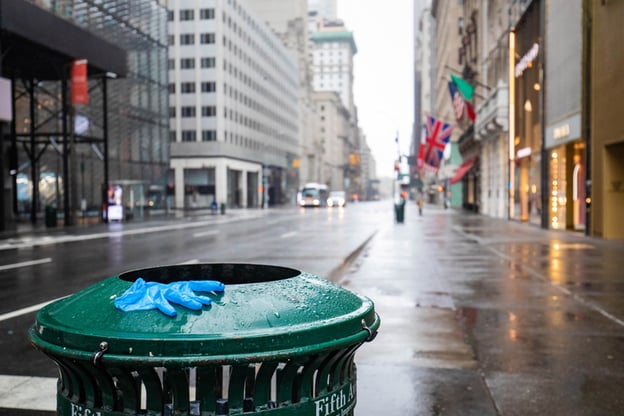
A number of decisions were handed down on the impact of the Pandemic on commercial leases.
New York City has enacted Local Law No. 55-2020, adding Administrative Code Section 22-1005 (“Personal liability provisions in commercial leases”), also known as the “Guaranty Law.” The Guaranty Law provides, in part, the following:
“A provision in a commercial lease…or [in another document] relating to such a lease…that provided for one or more natural persons…to become, upon the occurrence of a default or other event, wholly or partially liable for [amounts] owed by the tenant under such agreement…shall not be enforceable against such natural persons if the conditions of paragraph 1 and 2 are satisfied:
- The tenant satisfies the conditions of subparagraphs (a), (b) or (c):
(a) The tenant was required to cease serving patrons food or beverage for on-premises consumption or to cease operation under executive order number 202.3 issued by the governor on March 16, 2020;
(b) the tenant was a non-essential retail establishment subject to in-person limitations under guidance issued by the New York state department of economic development pursuant to executive order number 202.6 issued by the governor on March 18, 2020; or
(c) the tenant was required to close to members of the public under executive order number 202.7 issued by the governor on March 19, 2020.
- The default or other event causing such natural persons to become wholly or partially personally liable for such obligation occurred between March 7, 2020 and March 31, 2021, inclusive.”
In 40 X Owner LLC v. Masi, the Plaintiff-landlord sought to recover unpaid rent from the guarantor of a lease of office space. The Defendant argued that the Guaranty Law barred recovery. The Supreme Court, New York County, granted the Plaintiff’s motion for a default judgment on the issue of liability and directed the Plaintiff to file a note of issue for an inquest to determine the amount due. According to the Court,
“…the above provision does not apply in this case because this lease involved office space. It did not relate to a ‘non-essential retail establishment’, a restaurant, or to a company that was required to close to members of the public (such as gyms). There is no basis to find that this Administrative Code provision applies to a tenant that leased office space and simply stopped paying rent, even if the downturn in business was due to Covid-19.”
This decision, at 2021 NY Slip Op 30041, dated January 7, 2021 is posted at http://nycourts.gov/reporter/pdfs/2021/2021_30041.pdf.
The following rulings were issued by Judge Arlene P. Bluth, of the Supreme Court, New York County.
In 1140 Broadway LLC v. Bold Food, LLC, the Plaintiff-landlord sued the tenant and its guarantor for unpaid rent. The Defendants asserted as defenses the doctrines of frustration of purpose and the impossibility of performance. The tenant’s business was managing and consulting for restaurants. The Court held that the frustration of purpose doctrine “does not apply here, where the tenant rented office space, the tenant’s industry experienced a precipitous downfall and the tenant to [sic] no longer be able to pay the rent.” The Court also declined to apply the doctrine of impossibility. According to the Court, granting the Plaintiff’s motion for summary judgment on the issue of liability and ordering a trial to determine the amount of damages,
“‘[i]mpossibility excuses a party’s performance only when the destruction of the subject matter of the contract or the means of performance makes performance objectively impossible…’[citation omitted].…[A]lthough restaurants were required to scale back certain operations (such as indoor dining) because of the pandemic, they were not fully shut down. Many food establishments decided to shut down because of the financial consequences from both the pandemic and the public health orders, but that does not mean there was a ‘destruction of the subject matter’ contemplated in the contract at issue here, which was for office space [to provide consulting services] on the twelfth floor of an office building. The Court is unable to find that the doctrine of impossibility has any application here.”
This decision, at 2020 NY Slip Op 34017, dated December 3, 2020, is posted at http://www.nycourts.gov/reporter/pdfs/2020/2020_34017.pdf.
In ITS Soho LLC v. 598 Broadway Realty Associates Inc., a seven-year lease, of space in which the tenant was to build out and operate a gym, commenced March 15, 2020. On March 17 gyms were ordered to shut down until September 2020. The Tenant sought an Order rescinding and terminating the lease. The Court dismissed the case and directed the Clerk to enter a judgment including costs and disbursements. According to the Court,
“[a] temporary shut down of a gym does not constitute substantial frustration of a lease stretching for nearly a decade…That plaintiff’s preferred use of the premises might not be profitable for a few months is not a basis for this Court to intervene and rip up the contract… Plaintiff claims that defendant breached this covenant [of good faith and fair dealing] by refusing to negotiate to allow plaintiff out of the lease and continuing to charge rent while the plaintiff is unable to build out on the premises. The Court is unable to find that defendant’s refusal to accommodate plaintiff’s desire to rescind a contract constitutes a valid cause of action. Defendant was under no obligation to renegotiate the lease so that plaintiff could walk away and it would be left with a vacant space.”
This decision, at 2020 NY Slip Op 34300, dated December 22, 2020, is posted at http://www.nycourts.gov/reporter/pdfs/2020/2020_34300.pdf.
Similarly, the Court granted summary judgment as to liability in an action brought by a landlord against its lessee which had been operating a gym, and against the guarantor of the lease, for the non-payment of rent. Due to the Pandemic, the Defendants had raised defenses of frustration of purpose, impossibility of performance and the failure of consideration. According to the Court,
“[t]o permit the doctrines of impossibility or frustration of purpose to apply to commercial tenants who stopped paying due to the pandemic would raise countless questions. Would it apply to every commercial tenant and, if not, what is the criteria to quality for such relief? What about commercial tenants that were permitted to operate during the pandemic but still lost business? And because this is a widespread issue, there is a risk that considering tenants’ claims on a case-by-case basis would yield wildly inconsistent and unfair results. In other words, this is clearly the role of the other branches of government…”
As to the defense of the failure of consideration, “[t]his is not a case where they are forbidden from running a gym ever again at the premises.” Cab Bedford LLC v. Equinox Bedford Ave, Inc., 2020 NY Slip Op 34296, decided December 22, 2020, is posted at http://www.nycourts.gov/reporter/pdfs/2020/2020_34296.pdf.

